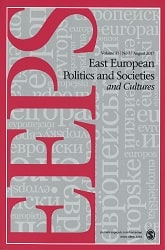What Bears Witness of the Failed Revolution? The Rise of Political Antisemitism during the 1905–1907 Revolution in the Kingdom of Poland
What Bears Witness of the Failed Revolution? The Rise of Political Antisemitism during the 1905–1907 Revolution in the Kingdom of Poland
Author(s): Wiktor MarzecSubject(s): Political history, Government/Political systems, Nationalism Studies, Pre-WW I & WW I (1900 -1919), History of Antisemitism
Published by: SAGE Publications Ltd
Keywords: anti-Semitism; 1905 Revolution; Russian Poland; National Democracy; socialism;
Summary/Abstract: This article investigates the rise of political antisemitism during the 1905–1907 Revolution in the Russian-controlled Kingdom of Poland. Extensive, diachronic discourse analysis of political leaflets reveals the role antisemitism played as a political device assisting the construction of new political identities and their dissemination through political mobilization. National Democracy and their labor branch, the National Workers Union, took the nation as the basic form of affiliation. The forging of such national unity, however, was difficult to engender among the workers owing to unique historical circumstances, the experience of exploitation, and longstanding socialist agitation. This process was aided, however, by the reference to a strong negative figure of the Other. When “nationalism began to hate,” antisemitism appeared to be an extremely effective mobilizing device, and the Jews started to act as a negative, constitutive point of reference for the construction of national unity among the Poles. The analysis of the mobilization process and focus on discourse as a main factor in shaping political identities demonstrates that National Democratic antisemitism was neither an automatic activation of already present popular anti-Jewish sentiments due to the rise of mass politics nor a sheer creation of nationalist ideologues. It was, rather, the logic of discourse that ushered in a need for a negatively evaluated outsider, Jews being easily invested in this place due to a particular sociodemographic conjuncture and older judeophobic tendencies.
Journal: East European Politics and Societies
- Issue Year: 30/2016
- Issue No: 01
- Page Range: 189-213
- Page Count: 25
- Language: English
- Content File-PDF

